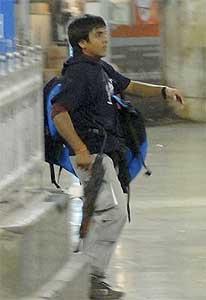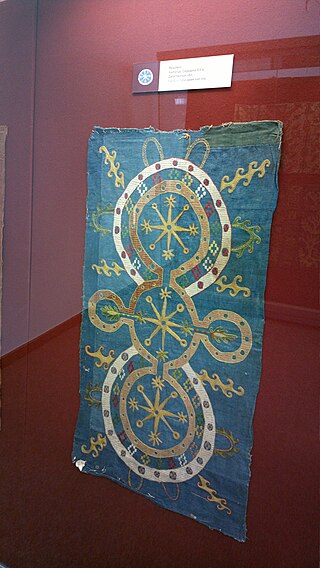See also
- Amir Hamja, New York Times photojournalist
- Ameer Hamza (born 1995), Pakistani cricketer
- Ameer Hamza Shinwari (1907–1994), Pashto-language poet
Amir Hamza may refer to:
Abu Hamza meaning father of Hamza, is a given name and a common alias used by several people, it may refer to:

Lashkar-e-Taiba is a terrorist group formed in Pakistan, and a militant and Islamist Salafi jihadist organisation. Described as one of Pakistan's "most powerful jihadi groups", it is most infamous outside Pakistan. The organisation's primary stated objective is to merge the whole of Kashmir with Pakistan. It was founded in 1985–86 by Hafiz Saeed, Zafar Iqbal Shehbaz Abdullah Azzam and several other Islamist mujahideen with funding from Osama bin Laden during the Soviet–Afghan War. It has been designated a terrorist group by numerous countries.
Lashkar may refer to:
Amir Hamza Khan Shinwari, commonly known as Hamza Baba was a prominent Afghan Pashto poet, playwright and author. His works are studied at Master-level at the University of Peshawar. He is considered a bridge between classic Pashto literature and modern forms. He founded the Khyber School in Pashto literature. A number of notable poets of this school, such as Nazir Shinwari, Khatir Afridi, and Khyber Afridi were his pupils.
Cheema is a Punjabi Jatclan of India and Pakistan.
Attribution of the 2008 Mumbai attacks were first made by the Indian authorities who said that the Mumbai attacks were directed by Lashkar-e-Taiba militants inside Pakistan. American intelligence agencies also agree with this attribution. Pakistan initially contested this attribution, but agreed this was the case on 7 January 2009. To back up its accusations, the Indian government supplied a dossier to Pakistan's high commission in Delhi. The Pakistan government dismissed the dossier as "not evidence," but also announced that it had detained over a hundred members of Jamaat-ud-Dawa, a charity linked with Lashkar-e-Taiba. In February 2009, Pakistan's Interior Minister Rehman Malik agreed that "some part of the conspiracy" did take place in Pakistan.

Mohammed Ajmal Amir Kasab was a Pakistani terrorist and a member of the Islamist terrorist organization Lashkar-e-Taiba through which he took part in the 2008 Mumbai terrorist attacks in Maharashtra, India. Kasab, alongside fellow Lashkar-e-Taiba recruit Ismail Khan, killed 72 people during the attacks, most of them at the Chhatrapati Shivaji Terminus. Kasab was the only attacker who was apprehended alive by the police.
Zakiur Rehman Lakhvi is a militant, terrorist, and co-founder of Lashkar-e-Taiba. One of the prime perpetrators of the 2008 Mumbai attacks, he is featured on India's NIA Most Wanted list. In January 2021, he was arrested by Pakistani authorities and sentenced to three concurrent five-year sentences in jail for terror financing in an unrelated case.
Hafiz Saeed is Pakistani Islamist militant, the co-founder of Lashkar-e-Taiba and the chief of Jama'at-ud-Da'wah
Amir Khan may refer to:
The February 2010 Kabul attack on 26 February 2010 was a combined suicide bombing and shooting attack. A car bomb levelled the Arya Guesthouse, also known as the Hamid Guesthouse, popular with Indian doctors. Two armed attackers then entered the nearby Park Residence, housing other foreigners. One detonated a suicide bomb, and the other was shot dead. The Safi Landmark Hotel nearby was badly damaged by the blasts. At least 18 people were killed and 36 more were injured.
Amir Hamza Hotak is an Afghan cricketer who plays for the Afghanistan national cricket team. An all-rounder, Hotak bats right-handed and bowls slow left-arm orthodox.
Abdul Rehman Makki is a Pakistani radical Islamist and the second-in-command of Jamaat-ud-Dawah (JuD) a Pakistani Islamic-welfarist-militant political organization and Naib Ameer of Lashkar-e-Taiba (LeT). He is the cousin and brother-in-law of Hafiz Muhammad Saeed. He has previously taught at the Islamic University of Madinah, Saudi Arabia, and, in 2004, released a book showing how fedayeen operations are not suicide attacks.
Fatali Khan or Fath Ali Khan of Quba was a khan of the Quba Khanate (1758–1789) who also managed to dominate the Derbent, Baku, Talysh and Shirvan Khanates, as well as the Salyan Sultanate during much of his reign.
Amir Hamza is the nom de guerre of a veteran of the Afghan mujahideen and one of the founders of the Islamic militant group Lashkar-e-Taiba. Described as "a fiery speaker and a prolific writer," he is also considered to be "the top LeT ideologue."
Tayyab is an Arabic male given name and surname meaning "good-natured". Related names include Tayyib, Tayeb or Tayyip. Notable people with the name Tayyab include:
Mahmoud Mohamed Ahmed Bahaziq is an Indian-Saudi jihadist. He became known by his nom de guerreAbu 'Abd al-'Aziz after leading one of Bosnia's early mujahideen groups. Bahaziq is subject to United Nations Security Council sanctions for funding Lashkar-e-Taiba (LeT) since the 2008 Mumbai attacks.
Ahmad Khan of Quba was a Khan of Quba and a successor of Fatali Khan who managed to dominate Derbent, Baku, Talysh and Shirvan Khanates, as well as Salyan Sultanate during much of his reign.

Amir Hamza III was an khan of Kaitags who ruled Kaitag Utsmiate from 1751 to 1787. He was known as a significant military figure in the history of Dagestan and Transcaucasia in the 18th century.

Kaitags are an ethnic group of the Dargins, but sometimes considered as a separate people. Their number are estimated to be over 25,000. They live mainly on the territory of the Kaytagsky district of Dagestan, partly on the plain and in cities. Part of the Kaitag people were resettled in Chechnya in 1944, from where they later moved to the north of Dagestan. They speak the Kaitag language of the Dargin branch of the Northeast Caucasian family, but the Dargin literary language and Russian are also common. They are mostly Sunni Muslims.